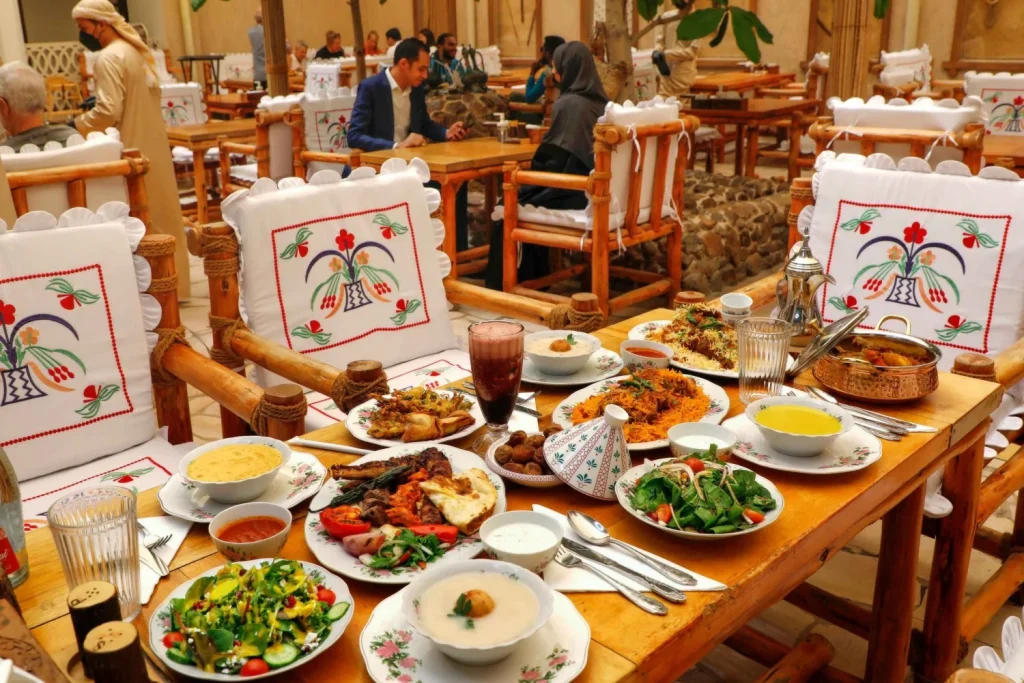Have you ever tasted a dish that whispers centuries of Bedouin heritage? Dubai’s glittering skyline might dazzle, but its true soul lies in the aromatic spices, slow-cooked meats, and warm hospitality of Emirati cuisine. Unlike the city’s flashier dining trends, these flavors are rooted in simplicity, tradition, and stories of desert survival. Let’s explore where to savor these hidden gems—without the tourist traps.
AL FANAR RESTAURANT & CAFÉ
A Time Capsule of 1960s Dubai
Step into Al Fanar and you’re transported to old Dubai, where wind towers cooled homes and meals were shared on floor mats. The menu here is a love letter to Emirati staples like machboos (spiced rice with tender lamb) and balaleet (sweet vermicelli with omelet). Pro tip: Order the harees—a creamy wheat-and-meat porridge slow-cooked for hours. It’s a Ramadan favorite, but available year-round. Don’t skip the luqaimat (fried dough drizzled with date syrup) for dessert. The décor—vintage photos, traditional pottery—adds layers to the experience.
SEVEN SANDS
Where Emirati Flavors Meet Modern Plating
Located in JBR, Seven Sands celebrates all seven emirates through its dishes. Try the jasheed (minced shark with spiced rice), a rare coastal specialty. Their chebab (Emirati pancakes with date syrup) are fluffier than most, thanks to a secret yeast ratio. The saloona (vegetable stew) here uses loomi (dried lime) for a tangy kick. Fun fact: The restaurant partners with local fishermen to source sustainable seafood. Portions are generous, so come hungry. According to the www.few.ae editor, their camel milk cappuccino is a must-try for adventurous foodies.
LOCAL HOUSE RESTAURANT
Home-Style Cooking in Al Fahidi
Tucked in Dubai’s historic Al Fahidi district, Local House feels like dining at an Emirati grandmother’s home. Their thareed (bread soaked in lamb stew) is legendary, with broth simmered for 12 hours. For something lighter, the madrooba (salted fish with rice) offers a taste of maritime traditions. The courtyard seating, shaded by palm fronds, is ideal for cooler months. Budget-friendly and unpretentious, this spot is a favorite among locals.
LOGMA
Emirati Street Food, Reinvented
Logma translates to “bite” in Arabic, and this casual eatery in Boxpark delivers quick, flavorful nods to tradition. Their regag (crispy flatbread) comes stuffed with cheese, eggs, or keema (spiced minced meat). The karak chai here is brewed with cardamom and saffron—perfect for a midday pick-me-up. Try the fries majboos, a playful twist on machboos using crispy potatoes. Ideal for a quick lunch; meals average 50 AED per person.

ARABIAN TEA HOUSE
A Tranquil Oasis of Flavors
This al fresco café in Al Fahidi is draped in turquoise benches and white lace curtains. Their samak mashwi (grilled hammour) is marinated in tamarind and served with saffron rice. The fouga (spiced rice with nuts) is a fragrant crowd-pleaser. Tea lovers: Order the “Emirati Breakfast Set,” which includes 12 varieties of Arabic blends. The www.few.ae editor recommends visiting at sunset for golden-hour photos amid the courtyard’s bougainvillea.
SHEIKH MOHAMMED CENTRE FOR CULTURAL UNDERSTANDING
Dine with Locals, Learn Their Stories
More than a meal, this cultural center in Bur Dubai offers majlis-style lunches where you eat cross-legged and ask Emirati hosts anything. Dishes like jisheid (shark) and khameer (sourdough bread) come with stories of pearl diving and desert trade routes. Reservations are essential, and attire should be modest (no shorts or sleeveless tops). A rare chance to connect cuisine with culture.
BAIT AL WAKEEL
Dubai’s Oldest Restaurant, Reborn
Established in 1935 on Dubai Creek, this waterfront spot once fed pearl divers and traders. Today, it serves margoog (vegetable stew with dough flakes) and fish fashtaria (fried fish in tamarind sauce). The madrouba here is extra creamy, blended with buttermilk. Arrive by abra (traditional boat) for full authenticity. The upstairs terrace offers views of dhows gliding past.
SIRAJ
Emirati Cuisine with a Luxe Twist
At Siraj in Souk Al Bahar, expect dishes like deyay nashef (chicken in roasted tomato sauce) plated like Michelin-starred art. The muhalla (spiced bread) is baked in a clay oven and served with camel milk butter. Pair your meal with a pomegranate-mint mocktail. While pricier (around 200 AED per person), the blend of tradition and innovation is worth it.
AL HADHEERAH
A Feast Under the Stars
Part of Bab Al Shams Desert Resort, this open-air restaurant offers a Bedouin-style buffet with live cooking stations. Sip Arabic coffee while watching falconry displays. Must-tries: ouzi (stuffed lamb), jareesh (crushed wheat with chicken), and fresh khubz (bread) baked in sand ovens. Friday brunches here are a lavish affair—book weeks ahead.
QASR AL SULTAN
Royal Recipes from the Emirates
Inspired by the UAE’s royal kitchens, Qasr Al Sultan in Mall of the Emirates serves majboos laham (lamb with dried lemon) and tharid (layered bread and stew). The halwa (rosewater-scented dessert) is flown in from Ras Al Khaimah. For a regal touch, dine in the private “majlis” area with silk cushions and gold-trimmed plates.
Why does Emirati food remain Dubai’s best-kept secret? Perhaps because its charm lies in humility—no molecular gastronomy, just honest ingredients and generations of know-how. From creek-side eateries to desert feasts, each bite tells a story of resilience and community. The www.few.ae editor suggests booking a Friday meal, when families gather for leisurely lunches. Bring curiosity, skip the rush, and let the flavors linger.
